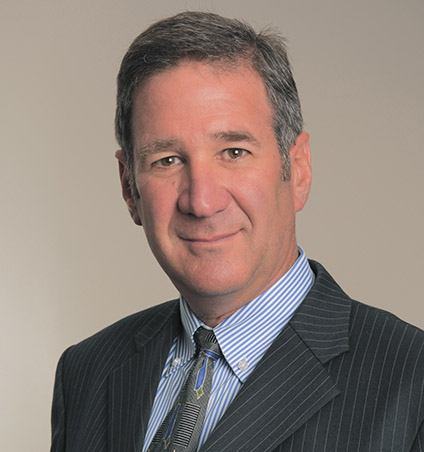Charting the Course
May You Live in Interesting Times
By Mitch Siegler, Senior Managing Director

“It’s not what we don’t know that gets us in trouble. It's what we know for sure that just ain’t so.”
- Mark Twain
2023 seems custom-made for that ancient Chinese curse (headline) and Twain’s famous quote. The year just ended was filled with surprises, which could be a warm-up act for 2024.
The economy surprised to the upside with falling inflation, a robust job market and booming stock market – maybe even a soft landing. Meanwhile, in a geopolitical and societal sense, 2023 was a hot mess. The new year portends further twists and turns, which we’ll unpack below.
A Surprisingly Good Year for the Economy and Markets
In 2023, inflation plummeted while unemployment stayed low; economic growth and the stock market were strong, and the banking system proved resilient. Looking ahead, we’re concerned about maturing real estate loans and a possible tipping point for government spending.
The Fed tamed inflation without tanking the economy (yet).
When the Fed stumbled in 2021, few imagined they would be so successful in bringing down inflation. The Fed’s 2.0% inflation target seemed like wishful thinking in June 2022 with inflation at 9.1%. November 2023’s inflation rate of 3.1% was near the Fed’s target, and food, energy and rent inflation have plunged. Job growth remains solid, with 216,000 new jobs in December – the 36th month of job growth. Work remains but hats off to the Fed!
Economic growth and the stock market outperformed expectations.
Those who thought Fed tightening would cause a recession are pleased with Gross Domestic Product (GDP) growth, which should end 2023 at 2.4%. Last January, few expected more than mid-single digit growth in the stock market. Who woulda thought the Morningstar U.S. market index would return 26.4% with the tech-heavy NASDAQ 100 index up 35.4%?
There were just a handful of bank failures.
When interest rates rise rapidly, bank failures often follow. We saw this in 2008-2012, after the Great Financial Crisis, when nearly 500 banks collapsed. We saw it in the ‘80s-‘90s, when high inflation sunk Savings & Loans and Thrifts – leading to 2,900 FDIC seizures. Pundits expected the worst last spring when First Republic Bank, Silicon Valley Bank and Signature Bank failed in short order because of a mismatch between assets (short-term deposits) and liabilities (longer-term Treasury securities). Nearly a year later, it looks like a nothing-burger.
Maturing real estate loans pose a major risk.
The Financial Stability Oversight Council (FSOC) says commercial real estate is among the major economic risks in 2024. FSOC’s 2023 annual report flags $6 trillion of commercial real estate loans outstanding – half held by banks – and says “a substantial volume” of these loans will mature in the next few years.
Office buildings will be hard hit because of reduced demand. We see challenges for multifamily, too; more than $500 billion of apartment loans mature in 2024-2025, many with adjustable interest rates which can’t be refinanced today. (Our long-term thesis for apartment demand remains constructive. We’re currently evaluating investment opportunities and will let you know when we launch a new opportunity fund.)
Is the U.S. deficit at a tipping point?
The U.S. hit its $31.4 trillion debt ceiling last January and after months of wrangling, Congress suspended the debt ceiling until January 2025. Phew, right? Well, debt is now $34 trillion, 1.2 times the nation’s GDP. Even following World War II, the ratio, 1.1, was lower.
Politicians from both parties spend like drunken sailors. Economists propounding modern monetary theory (“debt is no big deal”) seem straight out of the Alfred E. Neuman (of Mad Magazine) school: “What, me worry?” Like many new-fangled theories, this one doesn’t pass the sniff test.
 Until 2022, low interest rates constrained debt service costs. Times changed, debt exploded, Congress became more dysfunctional, and the wall of worry grew higher. In November, Moody’s cut the U.S. debt rating from “stable” to “negative.” Treasury Secretary Janet Yellen disagreed but acknowledged that debt levels could become problematic. With higher interest rates, the government pays more on new borrowings, leaving fewer funds for defense, healthcare, and social services. Inflation remains a challenge and higher deficits pressure inflation. You would hope that this would be a major issue in an election year but don’t bet on it.
Until 2022, low interest rates constrained debt service costs. Times changed, debt exploded, Congress became more dysfunctional, and the wall of worry grew higher. In November, Moody’s cut the U.S. debt rating from “stable” to “negative.” Treasury Secretary Janet Yellen disagreed but acknowledged that debt levels could become problematic. With higher interest rates, the government pays more on new borrowings, leaving fewer funds for defense, healthcare, and social services. Inflation remains a challenge and higher deficits pressure inflation. You would hope that this would be a major issue in an election year but don’t bet on it.
Are the Wheels Coming off the Geopolitical Bus?
2023 was a terrible, awful, no-good year geopolitically. Though we look ahead with hope, many fear that 2023 could be the warm-up act.
Russia, China, Iran, oh my!
Since the end of World War II, the U.S. has been the dominant superpower. After the U.S.S.R. imploded, China’s rise accelerated. Concerns about our deterrence rose after the 2021 U.S. pullout from Afghanistan. In 2022, Russia invaded Ukraine and the U.S. and Europe responded by sending Ukraine $100 billion in weapons, financial and security assistance. The conflict seems stalled and future aid is in doubt. Ukraine has defended its territory and people valiantly though Russia now controls 20% of its territory. Europeans wonder who’s next on Putin’s menu.
In 2023, China flew spy balloons over the U.S. and ratcheted up its provocations toward Taiwan and the Philippines. Chinese weapons and technology have powered Russia’s war machine and Russian oil has powered China’s economy. Xi and Putin are two peas in a pod.
Iran’s brazen aggression in the Middle East and attack drones and missiles, which Russia uses to pound Ukraine, is a piece of the same macabre puzzle. Hamas terrorists’ barbarity on October 7th should have been clarifying. Sadly, too many can’t connect the dots.
The Ukraine and Gaza wars are best seen as multi-front battles in a larger landscape. Russia, China, Iran (via proxies Hamas, Hezbollah and the Houthis – who attack commercial ships traversing the Red Sea) and North Korea (arming Russia and helping Hamas build its tunnel network) – are partners, fanning the flames of chaos and attacking democratic nations, particularly the U.S., Europe and Israel/moderate Arab states.
Many Americans care little about U.S. superpower status. Their disdain for sending dollars abroad ignores the costs of not doing so – like expending not just national treasure but also blood. If the U.S. loses its superpower status, the dollar’s reserve currency status could go, driving our borrowing costs higher and our standard of living lower.
Following attacks and threats against Israel, thousands of U.S. troops in the Middle East, and ships in the Red Sea, the U.S. positioned two forward aircraft carrier groups in the Mediterranean Sea. Asymmetrical warfare – when the bad guys launch $1,000 drones which we defend against with $1 million missiles – is unsustainable. The fate of Ukraine, Israel and Taiwan have broad implications for Europe, the Middle East and Asia – and the U.S.
Ignorance, Hypocrisy, and Double Standards
Ignorance abounds; too many demonstrate too little moral clarity.
Without moral clarity, our society is at risk. Ignorance breeds hate and conspiracy theories. When surveyed, 25% of Americans believe that the FBI instigated the January 6th Capitol attacks. Meanwhile, 20% of 18-to-29-year-olds think the Holocaust was a myth. When surveyed, most protestors screaming “from the river to the sea” can’t name the river or the sea – and don’t know that this is a call for genocide against Jews (many change their views upon learning the facts). Many calling for “intifada” (a revolution by any means – something many protestors are also unaware of) and to “globalize the intifada” (violent revolution, including killing Jews and Christians worldwide) are similarly clueless.
Hypocrisy and double standards.
As the pandemic highlighted structural weaknesses and inequities in our economy and health care system, October 7th exposed myriad double standards in our society. Antisemitism on campus was excused under the umbrella of “free speech” by university administrations. War crimes and rapes of Israeli women were ignored – by U.N. Women and myriad “women’s rights” groups. These actions – which would never be tolerated if perpetrated against any other minority group – were accepted, even celebrated. This hypocrisy exposes cracks in our society.
The Ivory Tower is wobbling.
America’s strengths stem from our educational institutions. In the past few decades, higher education has changed, and many universities’ reputations were scratched and dented in 2023.
Universities have long focused on academic excellence, individual merit, a free exchange of ideas and rigorous debate. Many top-tier institutions are in the news for other reasons: declining applications, soaring prices, burgeoning administrations, plagiarism, and admissions scandals (favoritism for athletes and children of graduates and donors).
Some institutions are under fire for pushing ideologies and an anti-Western worldview which has swallowed up large portions of curricula. When asked about their hatreds, students explain that they’re the product of what they’ve been taught in class: the west is built on white supremacism and each group of people falls into either the “oppressor” or the “oppressed” categories. There are widespread charges of discrimination against Asian and Jewish applicants and critics charge that admissions and tenure decisions revolve around race, ethnicity, and ideology.
Following October 7th, Jewish college students were harassed and intimidated, and university presidents offered Congressional testimony devoid of moral clarity when they wouldn’t say that calls for genocide against Jews violated campus policy. The president of Penn resigned. Harvard’s president, who later resigned, was also the subject of a plagiarism scandal, further embarrassing the university.
Macroeconomic forces – like the U.S. moving to onshore manufacturing and future jobs being dominated by technologies which barely exist today – will cause more young people to choose vocational school or other avenues, over traditional, overpriced, four-year colleges. (The data is bearing this out as college applications are falling while demand for vocational schools is rising at double-digit clips.) We expect more heads to roll on campus in 2024 and the pendulum to begin its long swing back toward the center.
Minority rules.
Certain obnoxious tweeters (redundant, you say?) on X (“Formerly Twitter”, we hate to say) similarly took up more than their fair share of oxygen and mindshare. In Congress, the Squad and the Gang of Eight (each a group of just eight of 435 members of the House on the left and the right) do the same thing. Recently, we’ve seen astounding media coverage on pro-Hamas protests in major cities and on campuses. The through line between these tweeters, fringe representatives and protestors: they make up for their small numbers with their volume and intensity. Diversity of viewpoints is necessary for a healthy democracy. Such discourse must be civil. The degree to which certain voices dominated conversations this year feels unhealthy.
The Elephant (and Donkey) in the Room: the ‘24 Presidential Election
Things we hold dear can disappear in a flash. Following the Great Financial Crisis, millions of Americans lost their homes and jobs. Covid-19 taught that personal freedoms aren’t assured, and government can’t always protect us. We’ve now learned that price stability can be fleeting. Trust in our institutions has been badly shaken.
President Biden won in 2020 on the strength of his experience and demeanor, which trumped his opponent’s chaotic behavior. At 81, with a 40% approval rating among Democrats, and lagging former President Trump in every poll, President Biden’s support for Ukraine has remained stalwart and he’s displayed strong backbone in withstanding pressure from his left flank to abandon Israel. One thing the current President has not been able to overcome – and it’s apparent in every poll – is his age. Two-thirds of Americans and most Democrats think he’s too old to run.
 The President’s reelection campaign has spent $40 million in key battleground states touting Bidenomics. Biden’s standing has not improved, it has worsened. People focus less on the Inflation Reduction Act and more on the price of groceries and gas. Channeling Chico Marx, “Who are you going to believe: me or your own eyes?”
The President’s reelection campaign has spent $40 million in key battleground states touting Bidenomics. Biden’s standing has not improved, it has worsened. People focus less on the Inflation Reduction Act and more on the price of groceries and gas. Channeling Chico Marx, “Who are you going to believe: me or your own eyes?”
Meanwhile, Biden’s likely opponent continually gains traction notwithstanding multiple indictments. Many who like his policies are put off by his demeanor. The 2024 election may be a contest between whether President Biden is too old or former President Trump is too chaotic. The next ten months will age us all.
Today, society is more polarized than ever. It’s never been more difficult to distinguish fact from fiction, truth from propaganda – and that’s before artificial intelligence really takes off. The polarization isn’t just between left and right, Democrat and Republican. These battles are playing out within both the Republican and Democratic parties. We must come together as citizens, lest we be torn apart as a nation.
Looking Ahead with Hope
On a hopeful note, maybe this will be the year that we begin to move beyond the zero-sum game of politics – I win / you lose – toward compromise, coexistence, and consensus building. Let us each do our part to contribute to a more civil society. Maybe we can move toward that by being more intentional in how we talk with and listen to one another. We have work to do, and it will take everyone rowing the boat together in 2024.
Whether you like to row, ski, cook, travel, paint, read or something else, we hope you enjoy the year. Best wishes for a healthy and happy 2024.
Mitch Siegler is Senior Managing Director of Pathfinder Partners. Prior to co-founding Pathfinder in 2006, Mitch founded and served as CEO of several companies and was a partner with an investment banking and venture capital firm. He can be reached at msiegler@pathfinderfunds.com.
Share this Article
